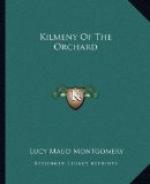“Eric, what about this girl? I hope you haven’t gone and made a fool of yourself. It sounds remarkably like it. A girl that has been dumb all her life—a girl with no right to her father’s name—a country girl brought up in a place like Lindsay! Your wife will have to fill your mother’s place,—and your mother was a pearl among women. Do you think this girl is worthy of it? It isn’t possible! You’ve been led away by a pretty face and dairy maid freshness. I expected some trouble out of this freak of yours coming over here to teach school.”
“Wait until you see Kilmeny, father,” said Eric, smiling.
“Humph! That’s just exactly what David Baker said. I went straight to him when I got your letter, for I knew that there was some connection between it and that mysterious visit of his over here, concerning which I never could drag a word out of him by hook or crook. And all he said was, ’Wait until you see Kilmeny Gordon, sir.’ Well, I will wait till I see her, but I shall look at her with the eyes of sixty-five, mind you, not the eyes of twenty-four. And if she isn’t what your wife ought to be, sir, you give her up or paddle your own canoe. I shall not aid or abet you in making a fool of yourself and spoiling your life.”
Eric bit his lip, but only said quietly,
“Come with me, father. We will go to see her now.”
They went around by way of the main road and the Gordon lane. Kilmeny was not in when they reached the house.
“She is up in the old orchard, Master,” said Janet. “She loves that place so much she spends all her spare time there. She likes to go there to study.”
They sat down and talked awhile with Thomas and Janet. When they left, Mr. Marshall said,
“I like those people. If Thomas Gordon had been a man like Robert Williamson I shouldn’t have waited to see your Kilmeny. But they are all right—rugged and grim, but of good stock and pith—native refinement and strong character. But I must say candidly that I hope your young lady hasn’t got her aunt’s mouth.”
“Kilmeny’s mouth is like a love-song made incarnate in sweet flesh,” said Eric enthusiastically.
“Humph!” said Mr. Marshall. “Well,” he added more tolerantly, a moment later, “I was a poet, too, for six months in my life when I was courting your mother.”
Kilmeny was reading on the bench under the lilac trees when they reached the orchard. She stood up and came shyly forward to meet them, guessing who the tall, white-haired old gentleman with Eric must be. As she approached Eric saw with a thrill of exultation that she had never looked lovelier. She wore a dress of her favourite blue, simply and quaintly made, as all her gowns were, revealing the perfect lines of her lithe, slender figure. Her glossy black hair was wound about her head in a braided coronet, against which a spray of wild asters shone like pale purple stars. Her face was flushed delicately with excitement. She looked like a young princess, crowned with a ruddy splash of sunlight that fell through the old trees.




